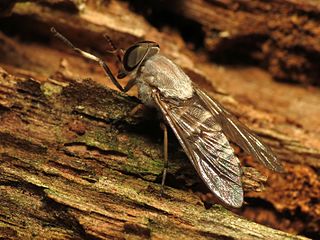
Siphonops annulatus, the ringed caecilian, is a species of caecilian in the family Siphonopidae from South America. It might have the broadest known distribution among terrestrial caecilian species.
The ring-tailed ground squirrel is a species of rodent in the family Sciuridae. It is endemic to the Pacific coast region of central Mexico. It is a common species and feeds mainly on fruits and nuts. The IUCN has assessed it as being of "least concern".

The lesser guitarfish or lesser sandshark is a species of fish in the Rhinobatidae family. It is found in Angola, Namibia, South Africa, and possibly Mozambique. Its natural habitats are shallow seas and estuarine waters. It is threatened by habitat loss.

The clown killi or banded panchax, is a species of fish in the family Nothobranchiidae, an African rivuline, native to fresh water habitats in Guinea, Liberia and Sierra Leone in West Africa.>

Goniobranchus annulatus is a species of sea slug, a very colourful dorid nudibranch, a shell-less marine gastropod mollusc in the family Chromodorididae.

Labidiaster annulatus, the Antarctic Sun starfish or wolftrap starfish is a species of starfish in the family Heliasteridae. It is found in the cold waters around Antarctica and has a large number of slender, flexible rays.

Emydocephalus annulatus, commonly known as the turtleheaded sea snake or egg-eating sea snake, is a species of sea snake that can be found in waters of Oceania near Australia and some Pacific Islands such as the Philippines and the Loyalty Islands of New Caledonia. The geographic range is sporadic, for example, with populations distributed near the eastern and western coasts of Australia in the Great Barrier Reef and the Timor Sea reefs, respectively. They do not, however, occur in the Gulf of Carpentaria along the north coast.

Hemilophini is a tribe of longhorn beetles of the subfamily Lamiinae.

Hologymnosus annulatus, the ring wrasse or ringed slender wrasse, is a species of marine ray-finned fish from the family Labridae, the wrasses, which has a wide Indo-Pacific distribution.
Oedudes alayoi is a species of beetle in the family Cerambycidae. It was described by Zayas in 1956. It is known from Cuba.
Oedudes callizona is a species of beetle in the family Cerambycidae. It was described by Henry Walter Bates in 1881. It is known from Belize, Guatemala, Honduras and Mexico.
Oedudes ramsdeni is a species of beetle in the family Cerambycidae. It was described by Fisher in 1926. It is known from Cuba.
Oedudes roberto is a species of beetle in the family Cerambycidae. It was described by Fisher in 1935. It is known from Cuba.
Oedudes scaramuzzai is a species of beetle in the family Cerambycidae. It was described by Fisher in 1936. It is known from Cuba.

Oedudes spectabilis is a species of beetle in the family Cerambycidae. It was described by Dru Drury in 1782. It is known from Colombia, Mexico and Panama.

The Cattle tick,, is a hard-bodied tick of the genus Rhipicephalus. It is also known as North American cattle tick, North American Texas fever tick, and Texas fever tick.

Tubulanus annulatus, commonly known as the football jersey worm, is a species of ribbon worm in the phylum Nemertea. It ranges across the northern Atlantic Ocean, the North Sea and the Mediterranean Sea, being present from the lower shore down to about 40 m (130 ft), on sand, gravel and other habitats.

Leucotabanus annulatus is a species of horse flies in the family Tabanidae.

Hylaeus annulatus, the annulate masked bee, is a species of hymenopteran in the family Colletidae. It is found in North America and Europe.
Scaphiodontophis annulatus, commonly known as the Guatemala neckband snake, is a species of snake in the family Colubridae. The species is native to southern Mexico, Central America, and Colombia. There are four recognized subspecies.












